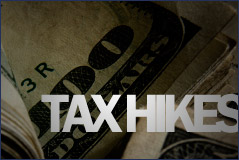Media

How the $650 Million Tax Increase Impacts You
The state budget is, for all intents and purposes, complete. While it remains unbalanced, we now know exactly which taxes are going up.
The $650 million tax hike passed by the legislature is less destructive than Governor Wolf's $2.7 billion proposal—which would have taken another $850 per family of four—but it still demands more of working Pennsylvanians in the midst of a struggling economy.
The chart below breaks down the additional $204 per family of four in new taxes. It also shows which Wolf tax hikes were not approved.
| Tax Hikes in the 2016-2017 Budget | |||
|---|---|---|---|
| State Tax Rate Changes |
Total Revenue (thousands) |
Per Capita | Per Family of Four |
| Income tax on lottery winnings | $15,800 | $1.23 | $4.94 |
| Digital downloads sales tax | $46,900 | $3.66 | $14.65 |
| Bank shares tax | $23,000 | $1.80 | $7.19 |
| Cigarette tax hike | $431,100 | $33.67 | $134.69 |
| Smokeless tobacco and e-cigarettes tax | $64,600 | $5.05 | $20.18 |
| Limit on vendor sales tax discount | $55,500 | $4.34 | $17.34 |
| Gambling tax on table games | $16,800 | $1.31 | $5.25 |
| Total State Tax Increases | $653,700 | $51.06 | $204.24 |
Low-income Pennsylvanians will feel the brunt of the tax increases, since the bulk of the new revenue comes from cigarettes and tobacco products. Those making less than $30,000 spend 14.2 percent of their income on tobacco, while those earning between $30,000 and $59,999 spend only 4.3 percent.
To add insult to injury, politically-favored corporations were awarded new forms of corporate welfare. The final budget increases the film tax credit for Hollywood film producers by $5 million, beginning next year, and adds at least $9 million in a variety of other corporate handouts.
To shield Pennsylvanians from higher taxes, elected officials must control spending. A great place to start is reducing corporate welfare by limiting borrowing and tax credits. Passing true pension reform will also go a long way in relieving the long-term budget squeeze on school funding.